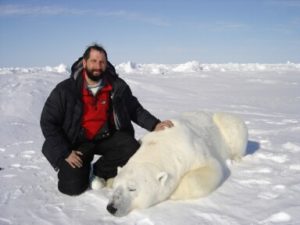Innovation Anthology #104: President

When it comes to polar bears, loss of habitat means the loss of sea ice. And in 2007, sea ice melted at an unprecedented rate – a good indication of the impact of global warming.
Polar bear expert Dr. Andrew Derocher says the sea ice conditions of 2007 are something scientists didn’t expect to see until around 2050. And this advancement of habitat degradation due to climate change has serious consequences for polar bears.
DR. ANDREW DEROCHER: What will be important is what happens over about the next 50 years. Current projectionss are from modeling data that we have. And looking forward with sea ice patterns and climate, it looks very clear like populations are going to be disappearing from much of their range, probably up to about two thirds. We’ll probably hold on to polar bears at least to the end of this century at the very high reaches of the Canadian Arctic and northern Greenland. That’s current the projection.
That’s why Dr. Derocher believes we have a very limited window of time to act on climate change.
DR. ANDREW DEROCHER: If we don’t stabilize the climate, I think the problem is that we won’t be able to help biological communities because by the time they are truly threatened, we will be dealing more or less only with human issues.
FOR INNOVATION ANTHOLOGY, I’M CHERYL CROUCHER
Guest
John McDougall,
National Research Council of Canada, Ottawa, Ontario, Canada,
Sponsor
Program Date: 2008-01-31